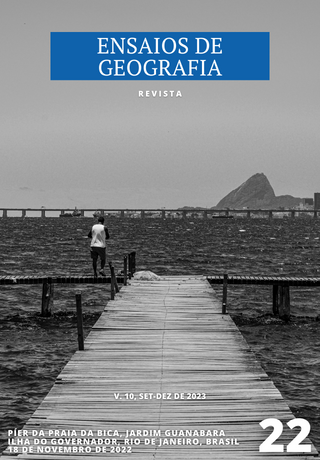EVALUATING ENVIRONMENTAL EDUCATION OF GEOGRAPHY CLASSES IN ELEMENTARY EDUCATION IN THE CITY OF JOÃO ALFREDO – PERNAMBUCO, BR
DOI:
https://doi.org/10.22409/eg.v10i22.59433Keywords:
Environmental Education (EE), Geography Teaching, BNCCAbstract
This article aims to analyze how Environmental Education (EE) is being worked in Geography classes in Elementary School in the municipality of João Alfredo - PE in the light of a methodology of qualitative and exploratory approach. As procedures for analysis and data collection, bibliographic research was carried out, together with a survey using a questionnaire, applied to teachers who teach Geography in the Elementary School in the municipality of João Alfredo - PE. From the results obtained, it can be concluded that teachers who teach Geography, for the most part, have difficulties in working the themes of EE due to some factors, such as, for example, the fact that the BNCC does not value the EE, lack of support from the management team (managers and coordinators), difficulties to teaching materials beyond the textbook, limited workload, and lack of training in geography (degree) by many professionals who teach geography in the municipal network of the municipality João Alfredo. It was also reported by respondents that the Covid-19 pandemic motivated them to work on environmental education recurrently, showing its importance in the context of teaching Geography.
Downloads
References
ALVES, R. Por uma educação romântica. 9 ed. Campinas: Papirus, 2012.
BISPO, M. O. A concepção de natureza na Geografia e a relação com a Educação Ambiental. Revista Terceiro Incluído, v. 2, n. 1, jan./jun. 2012, p. 41-55. Disponível em: . Acesso em: 14 de ago. 2023.
BRANCO, E. P.; ROYER, M. R.; GODOI BRANCO, A. B. A abordagem da Educação Ambiental nos PCNs, nas DCNs e na BNCC. Nuances: estudos sobre Educação, v. 29, n. 1, 2018. Disponível em: <https://revista.fct.unesp.br/index.php/Nuances/article/view/5526>. Acesso em: 28 de out. 2022.
BRASIL. Base Nacional Comum Curricular: educação é a base. 3ª versão revista. Brasília: MEC, 2017. 396 p.
BRASIL. Diretrizes Curriculares Nacionais da Educação Básica. Brasília: MEC, SEB, DICEI, 2013. 562 p.
BRASIL. Parâmetros Curriculares Nacionais: terceiro e quarto ciclos do Ensino Fundamental: temas transversais. Brasília: MEC/SEF, 1998. 436 p.
CASTELLAR, S. M. V. A Formação de Professores e o Ensino de Geografia. Terra Livre, [S. l.], v. 1, n. 14, p. 51–59, 2015. Disponível em: <https://publicacoes.agb.org.br/terralivre/arti cle/view/374>. Acesso em: 28 dez. 2022.
CAVALCANTI, L. S. Proposta Curriculares de Geografia no Ensino: Algumas Referências de Análise. Revista TERRA LIVRE, São Paulo, Nº 14: 111-128, 1999. Disponível em: <https://docplayer.com.br/87805289-Propostas-curriculares-de-geografia-no-en sino-algumas-referencias-de-analise.html>. Acesso em: 24 out. 2022.
CHAVES, A. L.; FARIAS, M. E. Meio ambiente, escola e a formação de professores. Ciência & Educação, v. 11, n. 1, p. 63-71, 2005. Disponível em: <https://www.scielo.br/j/cie du/a/N9R7KgCZsX nV87XRgRy3vmc/abstract/?lang=pt>. Acesso em: 12 nov. 2022.
COCATO, G. P. Crítica à educação ambiental no ensino de geografia: discussões e propostas pedagógicas. Geousp, v. 25, n. 1, p. 1-21, e-158138, 2021. Disponível em: . Acesso em: 03 de nov. 2022.
FREIRE, P. Pedagogia do Oprimido. Rio de Janeiro: Paz e Terra, 1987.
FREIRE, P. Pedagogia da Indignação: Cartas Pedagógicas e outros escritos. São Paulo: UNESP, 2000.
GIL, A. C. Como elaborar projetos de pesquisa. 4. ed. São Paulo: Atlas, 2002.
INSTITUTO NACIONAL DE ESTUDOS E PESQUISAS EDUCACIONAIS ANÍSIO TEIXEIRA. Sinopse Estatística da Educação Básica 2021. Brasília: Inep, 2022. Disponível em: <https://www.gov.br/inep/pt-br/areas-de-atuacao/pesquisas-estatisticas-e-indicadores/cens o-escolar/resultados>. Acesso em: 30.05.2022.
KAERCHER, N. A. Geografia é nosso dia-a-dia. Boletim Gaúcho de Geografia, n. 21. ago., 1996. Disponível em: <https://seer.ufrgs.br/index.php/bgg/article/view/38639/26361>. Acesso em 27 de out. 2022.
LAKATOS, E. M.; MARCONI, M. A. Fundamentos da metodologia científica. São Paulo: Atlas, 2003.
MEDINA, N. M. Formação de Multiplicadores para Educação Ambiental. Revista Eletrônica do Mestrado em Educação Ambiental – FURG. Vol. 1, out–dez/1999. Disponível em: <https://scholar.google.com.br/scholar?hl=pt-BR&as_sdt=0%2C5&q=medina+ 1999+%C 3%A7%C3%A3o+ambiental&btnG=>. Acesso em: 20 out. 2022.
MENEGUZZO, I. S.; MENEGUZZO, P. M. Educação Ambiental: possibilidades e desafios no processo ensino-aprendizagem da geografia escolar. Revista Brasileira de Educação Ambiental (RevBEA), v. 8, n. 2, p. 10-19, 2013. Acesso em: <https://periodicos.unifesp.br/ index.php/revbea/ article/view/1805>. Acesso em: 02 nov. 2022.
MINAYO, M. C. S. (Org.). Pesquisa social: teoria, prática e criatividade. 26. ed. Petrópolis, RJ: Vozes, 2007.
PELICIONI, M. C. F.; PHILIPPI JÚNIOR., A. Bases Políticas, Conceituais, Filosóficas e Ideológicas da Educação Ambiental. In: PHILIPPI JÚNIOR., A.; PELICIONI, M. C. F. Educação ambiental e sustentabilidade. 2. ed. Barueri/SP: Manole, 2014. p. 03-12.
REIGOTA, M. O que é educação ambiental. 2 ed. São Paulo: Brasiliense, 2009.
SANTOS, M. Metamorfoses do espaço habitado. São Paulo: Edusp, 1988.
SILVA, J. B. C.; SILVA, M. V. S. S. O Papel da Educação Ambiental em época de pandemia e pós-pandemia. Revista Brasileira de Educação Ambiental (RevBEA), v. 17, n. 6, p. 478–497, 2022. Disponível em: <https://periodicos.unifesp.br/index.php/revbea/article/view/ 13968>. Acesso em: 5 dez. 2022.
SILVA, S. N.; LOUREIRO, C. F. B. O sequestro da educação ambiental na BNCC (educação infantil - ensino fundamental): os temas sustentabilidade/sustentável a partir da agenda 2030. In: ENCONTRO NACIONAL DE PESQUISA EM EDUCAÇÃO EM CIÊNCIAS, 12., 2019, Natal. Anais [...]. Natal: ABRAPEC, 2019. Disponível em: <https://abrapecnet.org.br/enpec/xii -enpec/anais/lista_area_05_1.htm>. Acesso em: 14 ago. 2023.
SILVA, W. I.; OLIVEIRA, J. G. R. Práticas de Educação Ambiental nas aulas de geografia do ensino médio: reciclando velhos hábitos. Revista Brasileira de Educação Ambiental (RevBEA), v. 14, n. 1, p. 316–361, 2019. Disponível em: <https://periodicos.unifesp.br/index. php/revbea/article/ view/2706>. Acesso em: 01 nov. 2022.
WINK, G. O. Um olhar crítico sobre a Educação Ambiental: a Geografia como instrumento para construir novas perspectivas. Trabalho de Conclusão de Curso (TCC) - Universidade Federal do Rio Grande do Sul, Instituto de Geociências. Porto Alegre-RS, 2022. Disponível em: <https://lume.ufrgs.br/handle/10183/239298>. Acesso em: 18 nov. 2022.
Published
How to Cite
Issue
Section
License
Copyright (c) 2023 Da Revista (Ensaios de Geografia) e do Autor

This work is licensed under a Creative Commons Attribution 4.0 International License.
CC BY Attribution. Others may distribute, remix, transform, and build upon the material for any purpose, even commercially, provided they give the author and licensor the credits.


